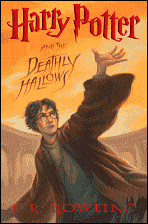 I wasn't planning on writing for another week or so, but this one's too good to pass up. I just caught this article in The New York Times about the final installment of the Harry Potter book series, Harry Potter and the Deathly Hallows, having made its way onto the internet. Someone got their hands on a copy of the book sometime before this Saturday's highly-anticipated release, photographed a good chunk of the pages, and then posted them online. I've checked around and, sure enough, there they are--at least, that is, until Potter's publishers get their act together and the takedown notices start flying!
I wasn't planning on writing for another week or so, but this one's too good to pass up. I just caught this article in The New York Times about the final installment of the Harry Potter book series, Harry Potter and the Deathly Hallows, having made its way onto the internet. Someone got their hands on a copy of the book sometime before this Saturday's highly-anticipated release, photographed a good chunk of the pages, and then posted them online. I've checked around and, sure enough, there they are--at least, that is, until Potter's publishers get their act together and the takedown notices start flying!Now, to all you Potter fans out there, you can rest assured that I'm not going to spoil any of the secrets. I like the books myself and respect your love of the series too much to do that. And to those of you who are hoping I'll spill the beans, sorry. You'll have to go elsewhere for that. My point in writing is to comment a bit on the Harry Potter security phenomenon. I talk about this at length in my upcoming book, The Late Age of Print: Everyday Book Culture from Consumerism to Control, which includes a chapter called "Harry Potter and the Culture of the Copy." Here I'll make just a few offhanded observations.
First, I take this security meltdown, and those preceding the release of the previous two Potter installments, as an effect of what in The Late Age of Print I call "the mass production of scarcity." Think about it: 12 million copies of Deathly Hallows have been printed in the U.S. alone. By now they're in bookstores all over the country, doing absolutely nothing as they sit locked away in stock rooms...other than generating hype.
Since Harry Potter and the Goblet of Fire, the boy wizard's publishers have been enforcing what the book industry calls "global lay-down dates," which, the publishers say, ensure that the books' surprises remain sacrosanct. Clearly, they don't. Even so, global lay-down dates do perform a kind of magic: they make Harry Potter, a mass-produced commodity if there ever was one, disappear despite his sheer ubiquity. And as anyone who's taken Business 101 will tell you, scarcity tends to augment demand.
My second observation pertains to the fact that Harry Potter and the Deathly Hallows made its way online in the form of digital photographs rather than, say, scans. The folks over at PC World have noted that, in doing so, the culprit may well have inadvertently revealed her or his identity:
In an interesting development it appears that the person who took the pictures of the book left his camera meta info attached to the image files. This is significant because with the camera meta data you can extrapolate the serial number of the camera. And with that information and time authorities could track down who took the pictures.Little did I--someone who studies digital culture--know that digital photos contain this kind of personal information. I suppose it's naive of me not to have realized this, since privacy is nothing if not compromised online. In the end, what a cautionary tale it will be if the pernicious Potter pilferer is apprehended because of the digital trace she or he has left behind.
And finally, despite most, if not all, of Harry Potter and the Deathly Hallows' secrets already having been revealed, I have nothing but confidence that all 12 million copies of the book will eventually sell--and then some.
No comments:
Post a Comment